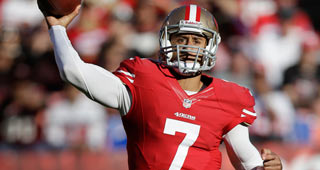The NFL's growing movement of players who are not standing at attention for the pregame rendition of the national anthem is becoming an issue of increasing magnitude for the league. It began with Colin Kaepernick a year ago, who owners feel remains toxically unemployable for his methods of protest. He is no longer alone, and now even the average, apolitical fan can no longer ignore it and are almost forced to take sides.
The stakes escalated on Monday night, when 11 Cleveland Browns knelt in prayer in the bench area while the national anthem played at FirstEnergy Stadium. Among the players “praying for our country” was Seth DeValve, who became the first white NFL player to openly join in protest during the Star Spangled Banner.
DeValve is no idiot. The second-year tight end is a Princeton grad, and he gave a very pensive and measured response following the game. Other Browns, including linebacker Christian Kirksey, did the same.
For many, the jump from Kaepernick refusing to stand for the national anthem as a form of social protest conjoined with the Black Lives Matter movement to a large group of racially diverse players using the platform to pray for America is just too much to tolerate.
Many turn to sports to escape from the loudness around us. We live in incredibly divisive and hyper-politicized times. Football has always been a respite from the drudgery of the workplace and, more recently, a quick diversion from the bitter divisiveness of everyday conversation.
These protests and prayers have removed those lines of demarcation. Those who cover it and interject their politics into the coverage, notably but not exclusively ESPN, have exacerbated the problem. Apparently, we can no longer have our weekly Sunday escape from the cacophony of finger-pointing, vitriolic attacks lobbed from the left and the right. Those of us in the middle cherish the escape, but we’ve lost the eject button from the political shouting.
The irony is the sudden resurgence in support of the national anthem. I’ve been attending sporting events since the 1970s and as far back as I can remember the mandatory playing of the song typically drew eye rolls and sighs more than cheers. The Simpsons even lampooned the widespread apathy towards the ritual:
"Due to popular demand, we will forego our National Anthem." #FRAHON #WorldCup2014 pic.twitter.com/r5PaNQ6v3M
— SimpsonsQOTD (@SimpsonsQOTD) June 15, 2014
Nobody used to pay attention to what players did. It wasn’t uncommon even 10 years ago for players, coaches and officials to remain in the locker room or the entrance tunnel until after the anthem was done. Nobody seemed to miss them or even notice their absence. Now it’s enough to make fans set their tickets and expensive jerseys on fire.
There must be a middle ground. It is not easy to find, however. I suspect the issue will simmer down as the protest become more widespread and the counter protests do the same. That’s true of the nation as a whole, not just the NFL. We are not to that point yet. We might not be anywhere close to it. The NFL had better hope we find it soon, because it’s getting increasingly bad for their business.



